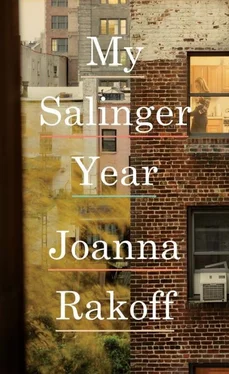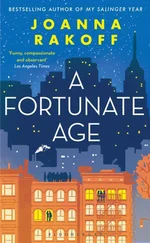I was wrong , I thought, as he walked off to make a Xerox of it for Don.
Walking home through the chilly wind, I remembered that the editor had actually said no. A good rejection letter was still a rejection letter. Perhaps I had been right.
I would’ve preferred, I supposed, to be wrong. Though I wasn’t at all sure.
I thought and thought about the fiction editor’s assistant. She had said to send more, and I felt, somehow, that we must send something immediately. I thought about the writer I’d pulled from the slush, the lovely novella about the girl and her alcoholic father. I’d been waiting for the right moment to present this potential client to my boss.
At the end of the day, I rapped softly at my boss’s door.
“So, I normally just send form letters back to the slush,” I said awkwardly. “But there was one query this summer that seemed interesting. So, I, um, asked for her novel. It’s actually a novella.” Suddenly I realized that I had potentially broken various rules. I should have brought the query letter to my boss first and asked permission to contact the writer. Seemingly all the blood in my body rushed to my face. “I don’t know if it’s to your taste. It’s quiet. And small in scale. But I think it’s good. I think it could sell.”
My boss smiled. “You know,” she said, “you should have talked to me before you asked to see her work. When you contact an author, you’re representing the Agency.” I understand , I started to say, but before I could make a sound, she’d held out her hand. “Let me see it,” she said.
That Friday, the mail contained a bundle of Salinger letters sent over from Little, Brown and several letters for me: the Salinger fans, writing back. I opened one, neatly typed on an ancient typewriter, smiling with delight, for reasons I couldn’t quite pinpoint. “Dear Miss Rakoff,” the note began, “if that’s who you really are.” My smile quickly disappeared. “Your name is so ridiculous that I am pretty certain it’s fake. I don’t know who you really are, but I’m assuming you’re using a pseudonym to protect yourself.” I laughed so loudly that Hugh shuffled in his chair, disrupted from whatever minutiae occupied him at that moment. “Well, whoever you are, I’m writing to tell you that you have no right to keep my letter, or anyone’s letter, from J. D. Salinger. I didn’t write to you. I wrote to him. If you think you can keep my letter, you’re wrong. Please send it to J. D. Salinger immediately.” I had no recollection of this person’s name, which probably meant I’d sent him a standard form letter, but I wasn’t sure. By this point I’d answered, God, hundreds of—a thousand?—fan letters.
I opened the next, which was addressed in bubbly, girlish script: the girl seeking an A via a response from Salinger. What was I expecting? An expression of gratitude for my harsh but helpful words? What I found instead were two pages filled with expletives, fired off in a bout of rage. “Who are you to judge me?” she asked. “You don’t know anything about me. I bet you’re some dried-up bitch who doesn’t even remember what it’s like to be young, just like all my teachers. I didn’t ask you for advice. I didn’t write to YOU. I wrote to J. D. Salinger. Probably you’re just jealous that you’re not young anymore, so you feel like you have to punish kids like me. Or you’re jealous of Salinger because he’s famous and you’re just some person.” There was a sort of beautiful truth to her note. I was, indeed, just some person.
Some person who was now beginning to understand why Hugh had handed me that form letter. To save me from myself.
“I’m talking to bigger printers,” Roger told me one day in October. There was a slight swagger in his voice that I’d not detected before. The enormity of this project was, it seemed, affecting him. Until now, he had been a publisher of small books, below-the-radar books, books that sold in hundreds rather than thousands. Now—it had hit him—he was publishing Salinger. Salinger . Whose books sold in the millions . Back in June, Roger had planned an initial print run of ten thousand: larger than any book in his catalog, but still quite modest. My boss had gone a ways toward convincing him that, as Hugh said, collectors could buy up ten thousand books before they even arrived in stores.
“If we go with a bigger print run, I run into another problem as well,” he said. “Where to store the books. Now, normally, I stash them in my father-in-law’s basement—”
“Wait, what?” I asked, laughing. The situation had now officially crossed the line into the absurd. J. D. Salinger was publishing with a press that stored books in someone’s basement .
“Yes, well, I store them in my basement, too, but it fills up pretty quickly…” his voice trailed off. “So if we’re talking a print run of thirty, forty, fifty thousand, I’d need to rent a storage facility, so that’s next on my list.” He sounded troubled, exhausted, as if these calculations were keeping him awake at night. Surely a larger print run meant a larger outlay of cash for Roger, who taught at a state university. Could he even afford any of this?
But there was another problem with the bigger printers, the printers who could handle Salinger-appropriate print runs. “Their bindings look cheap ,” he explained, disgustedly. “Perfect binding, rather than a true sewn binding. They’re essentially gluing the book instead of sewing it. I know Jerry won’t like it. I remember the contretemps over For Esmé years back.” Apparently, Jerry had been horrified by the quality of the British paperback of Nine Stories —called For Esmé—with Love and Squalor, and Other Stories in the U.K.—so horrified that he’d raised a huge fuss and broken with his longtime publisher, a close friend. Roger could endlessly spout this sort of Salingeriana. With each phone call he inched a little closer—in my mind—to the territory occupied by the fans. “I don’t want anything like that to happen. It’s too dangerous,” he said. “I just have to make a decision.”
“Why,” I asked Roger suddenly, “why do you think Jerry responded to your note?”
“Well, I used a typewriter—” he began.
“I remember,” I interrupted, as gently as I could.
“And I know he liked that. But—” He paused for a moment, and I could hear him breathing. He had a slight cold. “I suppose”—he paused again—“well, I didn’t tell him how much I loved his stories. I didn’t say, ‘Oh, The Catcher in the Rye is my favorite novel,’ or anything like that. Some instinct, something, told me not to fawn over him, not to tell him he was a genius or”—he adopted a stentorian, professorial tone here—“ an important American writer , or that kind of thing. I mean, I suppose that’s why he lives in Cornish, isn’t it?” I nodded, forgetting for a moment that I was on the phone, that Roger couldn’t see this gesture. “So that he doesn’t have people constantly telling him that he’s a genius. So that he can just be himself.”
“Yes,” I agreed. How lucky , I thought, that he knew exactly who that self was .
Harper’s turned down the story, too, as I knew it would, for their editor favored the ironic, the young, the “edgy.” The Atlantic declined, too. And so I began thinking about small magazines, small prestigious magazines, the magazines that would pay less—or little, or nothing—but would draw attention to my boss’s client. There was The Paris Review and Story , where Salinger had gotten his start, and a host of others. But there was one, in particular, that I thought might like this writer’s elegant precision. Before I could change my mind, I typed up a cover letter, clipped it to the story, and slipped the sheaf into a mailer. Done , I thought, smiling to myself. As I closed the thick Literary Market Place , my eye fell on the name of another magazine, a magazine that ran poetry with both rigor and heart, and fiction that was unlike anything one could read elsewhere. There on the page in front of me was the name of the poetry editor. Before I could think better of it, I plopped down in my seat again, pulled a sheet of plain bond out of my drawer, and pounded out a brief letter to him. Then I pulled from my drawer three of my own poems, poems I’d typed in the early hours before my boss arrived, the rest of the office consolingly dark. I clipped the letter to them and slipped them in a manila envelope, just as I did for Agency clients.
Читать дальше












